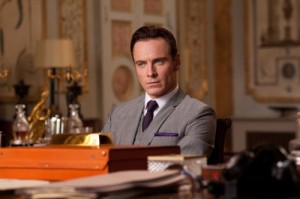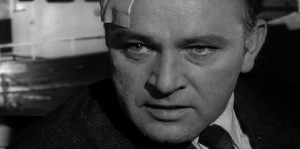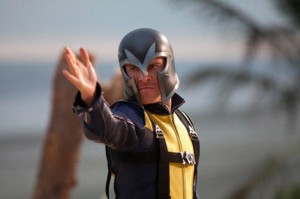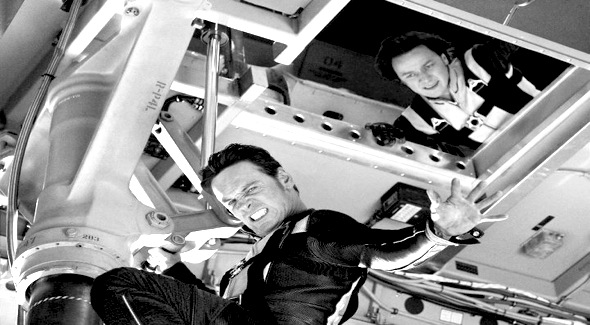A License to Kill
We have two archetypes for what a spy should look like in the Sixties. One is a cold, glamorous man of action. One is a convivial, clever bureaucrat. If First Class is a movie about espionage in the Sixties, which of its protagonist goes into which role?
Lensherr is clearly modeled after James Bond. In the first act, he does the most traveling: from Switzerland to Argentina to Miami. He operates without a network and extracts information from his targets by the most direct and painful means available. He’s not a psychopath, but he gets a frisson of pleasure out of seeing Nazis and Nazi collaborators squirm. And he always dresses the part: tight polo shirt in the pampas of Argentina, crisp grey suit in Switzerland.

(I have to credit Double-0 Section for the above image, as well as pointing out its parallel to Connery’s attire in From Russia With Love. The author touts Fassbender as a replacement for Daniel Craig in the Bond franchise. I say why not? And give James Bond magnetic powers while we’re at it)
While Xavier isn’t as obviously a parallel to Harry Palmer, the shoe still fits. Xavier is a clear antithesis to the obsessed Lensherr, and Palmer was designed as an antithesis to Bond. Xavier makes friends: the co-ed in the bar, his adopted sister Raven, Moira McTaggart and (later) the rest of the first class at the Xavier School. Xavier also plays well with a bureaucracy, putting the fears of the CIA directors at ease and bringing his recruited mutants to the Agency’s secret facility. He prefers not to use force, even shying away from killing Shaw in the end. He’s not a torturer or a fighter like Lensherr is.
Both Xavier and Lensherr operate outside the usual rules of engagement. They are spies and, insofar as they train the next generation, spymasters. And they have the same end goal in mind. This similarity of purpose enables them to be friends. But the difference in their methods means there’s only so far they can travel together.
So is Lensherr the mutant James Bond and Xavier the mutant Harry Palmer? That’s the closest analog available, though it’s not quite perfect. For one, Palmer is distinctly of lower class than Bond: Cockney accent, cheap flat, common concerns about paycheck. In First Class, we’re reminded several times that Xavier is of higher wealth and class than Lensherr. Xavier was raised in palatial comfort while Lensherr was being experimented on in Auschwitz.
But that’s clearly what Vaughn wants us to see. Lensherr is a cold man of action. Xavier is a friendly agent who gets by on his wits. They fit into the same Bond / Palmer dichotomy that shaped spy fiction in the Sixties.
However, James Bond and Harry Palmer never crossed paths. They operated in distinct fictional universes. So First Class presents us with a rare opportunity. The two archetypes of spy fiction are, for the first time, pitted head to head. They share the same goals – a world where mutants can live without fear of persecution – but differ on methods. Xavier wants to blend in to the social order, while Lensherr wants to give mutants the power to negotiate as equals.
The two differing methods of espionage are set against each other. Who wins?
Technically, neither of them.
The Mutant Who Came in From the Cold

There were actually three popular conceptions of spies in the Sixties: Ian Fleming’s, Len Deighton’s and John le Carre’s.
le Carré is the pen name of David Cornwall, a former Army Intelligence officer who joined MI6 in the earliest days of the Cold War. Though he started off writing simple detective fiction, his third novel, The Spy Who Came in from the Cold, was a moodier and more contemplative piece about the moral costs of espionage. It was a critical and commercial smash, enabling Cornwall to retire from the Foreign Office and write full time.
The le Carré novels since then have largely revolved around similar themes: how espionage, and the statecraft that requires it, chews up and spits out innocent lives. In his “Karla Trilogy” (Tinker, Tailor, Soldier, Spy; The Honourable Schoolboy; Smiley’s People), veteran spymaster George Smiley pursues his rival in the U.S.S.R. with a grinding obsession that leaves him feeling hollow in the end. The Little Drummer Girl and The Russia House depict civilians who get swept up in the games between states and the resulting wreckage of their lives.
For le Carré, the question of ends is almost irrelevant. The means themselves are bad enough.
How does X-Men: First Class end? (REPEATED WARNING ABOUT SPOILERS)

Xavier is lying on the beach, crippled from the waist down by a deflected bullet. Lensherr has gone from an optimistic partner in the battle for mutant rights to a nascent supervillain. Raven sides with Lensherr, abandoning the only family she’s ever had. Agent McTaggart is about to be all but disavowed by her agency. And the two greatest powers in the world now know about, and have explicit reason to fear, mutants.
But hey – those American and Russian navies are intact!
As far as endings go, that could come straight out of a le Carré novel. A group of civilians got swept up in a secret war between the East and the West. They advanced the interests of both sides, but got chewed up and spit out in the process. The fact that they survive as mere cripples and megalomaniacs is downright optimistic.
Xavier may be Harry Palmer and Lensherr may be James Bond. But both of those characters, despite their differing tones, are largely optimistic spies. They suffer and struggle, but they win in the end and emerge healthier for it. The protagonists of a le Carré novel – Alec Leamas, George Smiley and the rest – have no such happy ending. They are profoundly damaged by the energies that the West channels through them. Possibly because they’re not mutants.
X-Men: First Class combines the thesis and antithesis of popular spies in the Sixties to form a synthesis of deconstructed spy fiction. It puts two fictional archetypes in service of a real battle (the Cuban Missile Crisis) and a relatable, if fictional cause (mutant civil rights). The story that results suggests that this will be a war without any real heroes. Mutants will fight and die on both sides, either serving the interests of a state that fears them or giving up normal lives to live as villains. And the Cold War will press on.

Good article, but now I want to read spy novels!
Do it! Read them! Very rewarding.
Excellent review! And thanks for the link. I think you’re dead-on about the movie presenting the two types of Sixties spies and exploring that dichotemy, but I would equate Xavier to Smiley much more than Palmer. As you point out, his breeding has more in common with Le Carre’s character, for one thing. Not that Smiley grew up in that kind of wealth, but he later married into it. And he did go to Oxford, and I can totally picture him participating in that same sort of drinking celebration back in the days when he was recruited by Jebadee. Furthermore, he’s a social operator. As you point out, Xavier plays well with others and builds a team. Smiley always uses a team (Connie, Mendel, Guilliam, etc.), whereas Palmer would much prefer to work alone like James Bond. [Minor spoilers follow:] It’s true that the film doesn’t leave Xavier as emotionally wrecked as Smiley, but I’d say that the physical toll he pays is roughly equivalent.
Anyway, none of that alters any of your key points. Thank you for the fantastic analysis!
Excellent point! Although don’t forget Palmer had his team, too. Although I think the Smiley comparison holds as well. Smiley’s only “powers,” if you will, were his penetrating insight – his mutant mind – and the people with whom he surrounded himself.
This is an interesting take, Perich, and it reminded me that Vaughn – unlike Singer or Rattner, both American – is British, a fact which lends credence to your interpretation (and maybe also serves to explain some of the movie’s unfortunate racial missteps, as noted elsewhere.
In fact, it’s likely that Daniel Craig’s breakout gangster role in Vauhgn’s Layer Cake was what go him the role of Bond in the first place.
Racial missteps because he’s British? I would be interested to know why you think that, being British myself…
An interesting comparison I heard from a friend after seeing the movie was that Xavier is to MLK Jr. as Magneto is to Malcolm X. Anyone want to discuss?
That was brought up in the OTI podcast about the movie, actually. I thought of it, too! :)
That’s a pretty established comparison of their ideologies.
Great parallelism between the First Class protagonists and the fictional British spies!
An interesting thing to note about the movie, though: At the end of the movie, Raven/Mystique first chose to side with Xavier, but then Xavier convinces her to side with Lensherr for her to be able to express her mutant freedom.
Or should it be read as: Xavier knew what Raven really wanted (i.e. read her mind), and Raven was simply asking Xavier for permission?
Does the movie suggest that ultimately, the bureaucratic spy will bow down to the operational spy, no matter what differences in opinion there may be between each other?
I think Raven’s changing sides at Xavier’s behest is linked to the whole thing about how he never had to use his powers to know what she was thinking or wanted. Although painting it as him bowing to Erik sounds cooler. That’s just my opinion, though. :)
I do like the parallels, but I think X-Men: First Class is too caught up in its superhero origins to be entirely there. James Bond could arguably be compared with superheros, but not Palmer. And Xavier solves most of his problems by means of his powers, albeit far less directly applied than Lensherr. Even if he doesn’t use them, half the people he’s dealing with know about them, which changes the situation.
oh, and btw, I think you’ll find there was actually a fourth paradigm for spies in the sixties – Maxwell Smart.
oh, and btw, I think you’ll find there was actually a fourth paradigm for spies in the sixties – Maxwell Smart.
For which see Fantastic Four.
Is parody paradigm?
Fascinating article, one tangential and essentially irrelevant question. Why is the abbreviation co-ed used exclusively for female students? Is it some Ivy League tradition or something that filtered into the popular culture? Incidentally, the woman that Xavier tries to, as we Brits say, chat up, would not be educated co-educationally. Although the women’s colleges had been divested of the enforced quota keeping women’s levels low in 1957, and granting full collegiality in 1959, the education was segregated until 1974. The last men’s college became co-educational in 1984. The final women’s college became co-educational in 2008, my first year at the university.
Does that count as a Well, Actually? I don’t know.
Interesting, especially since women were allowed to vote in Britain earlier than here in the States… Hm…
Yeah, it’s very much clear that Oxford and Britain as a whole don’t map onto each other – read social mobility/income/etc. etc. etc. It doesn’t help that there’s now more people in our Cabinet who went to Magdalen College than there are women. Probably more people who went to a much smaller college than ethnic minorities. But that’s the Conservatives for you. (source: http://www.thisislondon.co.uk/standard/article-23873241-beware-a-cabinet-of-magdalen-college-men.do )
But don’t all the bar scenes take place in off-campus bars? I only spent a half year at Oxford, but I know that students from different colleges would mingle at the pubs around town. In fact, I rarely met other St. Anne’s students at the pubs I went to. Not to mention that there’s no real proof in the film that the woman Xavier chats up–or Raven for that matter–are even students. The woman could have been a townie. Raven could have been along for the ride for her protection. I actually thought the Oxford scenes were the most accurately depicted scenes in the whole film–that was exactly the kind of loose scholarship/philosophical bullshit flirting/heavy drinking I encountered while over there. Heavy drinking should be emphasized the most there.
I think that it’s when she talks to Raven that she asks something about her that shows that Raven isn’t a student and that the woman is. A bit like the ‘which college are you at?’ ‘Actually, I’m at Brookes’ conversations today. Except that Brookes people are usually nicer than Uni. The main pub looked like the Tom Tavern/St. Aldates to me, and one was a bit of Hertford that I think was standing in for the Eagle and Child called ‘The Eagle’. Yeah, even fifty years afterwards, I thought the Oxford bits were pretty accurate. The yards of ale were often boasted about by former-Rhodes-scholar professors. During lectures.
It may be that St. Anne’s, which from my experience has a great community spirit, doesn’t need to get out as much/only ever goes to the Royal Oak/whereas the other colleges are desperate to escape (see: Christ Church).
I liked First Class, but one thing about it left me ambivalent: the fact that Magneto is more heroic, and more importantly is more interesting, than Xavier.
Sure, he’s a morally-ambiguous, revenge-driven killer from his first adult scene. And sure, it’s good that he’s a well-developed character. But while he’s hunting Nazis, Xavier is using picking up chicks. While he’s traveling the world to avenge his family, Xavier is building an impromptu school just because he’s a nice guy. And while he ends up with a genuine team of misfits, the ones who stand with Xavier are all able to pass for normal except for one guy who really, really wishes he could. Everything in this movie leads me to support and prefer the cold-blooded monster from the first first three X-Men movies.
Sorry it took so long to respond to this post, but, well, it took me a long time to get around to seeing the movie!
Anyway, what I can’t quite comprehend is why neither the article nor ANY of the comments has yet brought up The Avengers! Bond & the Avengers were the comparisons that permeated my mind throughout the film, both aesthetically and philosophically.
While I haven’t read the Harry Palmer stuff, it seems like all of the imperfections in comparing him to Xavier are solved when comparing Xavier to John Steed instead… and the sense of “working with a team” is certainly heightened. I don’t know if you were only looking at spy *novels* exclusively, or spy *films* exclusively, but I don’t think you can ignore the Avengers series in any discussion of ’60s spies.